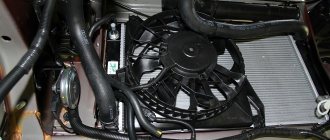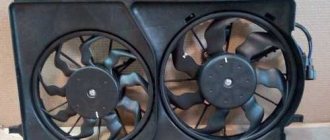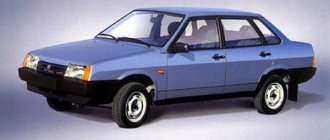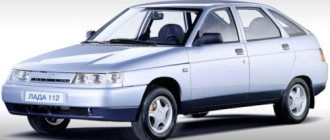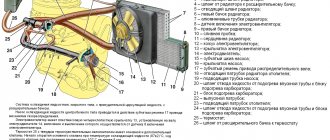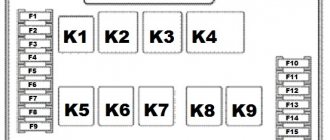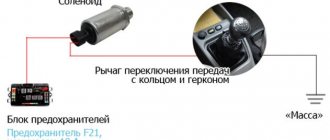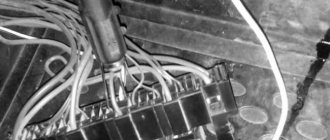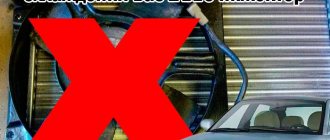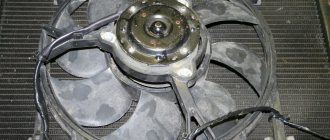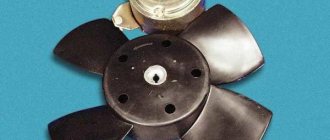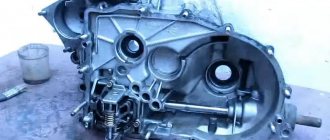Modern domestically produced cars are equipped with various types of controllers and sensors that ensure full functionality of the car. If one of the devices fails, this may cause the units to malfunction. From this material you will be able to find out what the Priora and Kalina fan switch is, and what malfunctions are typical for it.
If the Lada Kalina cooling fan fails, you should immediately find the cause and eliminate it. If the machine boils over, it can have fatal consequences. At best, the gasket is damaged, and at worst, the cylinder head is deformed, which will lead to its forced replacement. Therefore, it is worth monitoring this device and conducting regular diagnostics.
How to find the reason
Let's start by checking the electric motor. Disconnect the electrical wires and connect directly to the battery, observing the polarity. If the fan doesn't start, that's the problem. If it works, you need to look for another reason.
Check all contacts on the connectors, as well as behind the relay and fuse. They are located in an additional mounting block, which is located on the right side of the instrument panel next to the lower heater duct.
The fuse (50A) can be checked with a tester; it is better to take a working relay and install it in the appropriate socket. If the problem is not resolved, continue.
Check temperature sensor. Warm up the engine to operating temperature, stop the engine and disconnect the sensor. It is located on the top of the thermostat housing. When the sensor is disabled, the controller must independently start the fan for continuous operation.
Start the engine and wait until the fan starts. If the coolant temperature has reached a critical temperature and the fan does not turn on, look for a broken wiring.
Do I need to change the fan?
If you determine that the problem is in the fan itself, or more precisely in its motor, you can try to fix it. Most often it stops working due to broken brushes or problems with the rotor bearings. The commutator or winding crack is rarely damaged.
If the fan cannot be repaired, it must be replaced.
Under no circumstances should you drive a vehicle with the fan not working. Overheating of the engine inevitably leads to the destruction of rubber hoses of the cooling system, seals, and can also cause failure of the piston group elements.
List of contact relays
If we open the main fuse box of Kalina 2, we will see a set of electrical relay housings. There are no other blocks containing relays in the car. We list the elements used in the “Lux” package (21927/21947):
- K1: radiator fan relay;
- K2: relay switching on door locks;
- K3: additional starter relay;
- K4: additional relay (switches current 50A);
- K6: wiper relay;
- K7: relay that turns on the high beam;
- K8: signal relay;
- K9: relay that turns on the low beam;
- K10: rear window heater relay;
- K11: main ignition relay;
- K12: relay turning on the fuel pump;
- K13: additional relay;
- K14: radiator fan relay 3;
- K15: windshield heater relay 1;
- K16: windshield heater relay 2;
- K17: relay that turns on the air conditioning compressor.
You can compare the layout of elements in “Lux” and in “Norm/Standard”:
Let's consider the data relevant for the “Normal/Standard” configurations:
- K1-K12: as above;
- K13: radiator fan relay 3;
- K14: windshield heater relay 1;
- K15: windshield heater relay 2;
- K16: air conditioning compressor relay.
The last list is also relevant for Kalina Cross Norma. And in more expensive trim levels of the crossover, the “Lux” scheme will probably be used.
Is there a need to replace the fan?
Having determined that the fan or electric motor is faulty, you can try to repair it. Firstly, in Kalina 1.6 (8-valve), the cooling fan does not turn on if the brush is damaged or the rotor bearings fail. Less often, the problem should be in the distributor or winding breakage.
If the device cannot be repaired, the component must be replaced. Do not attempt to drive a vehicle with a damaged fan. Overheating of the engine automatically leads to rupture of hoses, wear and improper use of seals. action of the pistons.
Features of the system functioning
Simultaneously with the functioning of the system, parts work that allow you to monitor the heating of the oil in the engine, as well as the ambient temperature. In addition, the actuation process is also influenced by a number of vehicle electrical sensors. Only the correct functioning of all these elements leads to the fact that the Kalina fan switch-on sensor performs its functions efficiently.
The movement of the liquid itself also depends on temperature. There are two traffic circles on Kalina: large and small. In the second case, the antifreeze passes by the radiator, at this moment the thermostat is closed. As the temperature rises, the device slowly opens, so that the liquid enters the radiator, where it is cooled by a powerful air flow. When this is not enough, the fan also turns on.
Looking for a reason
Start checking with the electric motor. To do this, disconnect the electrical wires from it and connect directly to the battery, observing the polarity. If the fan doesn't start, that's the problem. If it works, you need to look for another reason.
Check all contacts on the connectors, as well as behind the relay and fuse. They are located in an additional mounting block, which is located on the right side of the instrument panel next to the lower heater duct.
The fuse (50A) can be checked with a tester; it is better to take and install the relay. into the appropriate slot. If the problem is not resolved, continue.
Check temperature sensor. To do this, warm up the engine to operating temperature, turn it off and disconnect the sensor. It is located on the top of the thermostat housing. When the sensor is disabled, the controller must independently start the fan for continuous operation.
Start the engine and wait until the fan starts. If the coolant temperature has reached a critical temperature and the fan does not turn on, look for a broken wiring.
Do I need to change the fan?
If you determine that the problem is in the fan itself, or more precisely in its motor, you can try to fix it. Most often it stops working due to brush failure or problems with the rotor bearings. The commutator or winding crack is rarely damaged.
If the fan cannot be repaired, it must be replaced.
Under no circumstances should you drive a vehicle with the fan not working. Overheating of the engine inevitably leads to the destruction of rubber hoses of the cooling system, seals, and can also cause failure of the piston group elements.
Why do you need DVV?
When driving for a long time in a low gear or idling for a long time, the radiator does not receive sufficient airflow. As a result, the coolant temperature rises sharply and the liquid may boil. Frequently occurring engine overheating can cause premature wear of the piston group of engine cylinders. When exposed to high heat, the surfaces of rubbing parts begin to lose their strength characteristics, which causes their destruction. In the end, this will lead to a major overhaul of the engine, accompanied by large financial costs.
To protect the car from such phenomena, the radiator is equipped with a fan, which, through forced airflow, sharply lowers the temperature of the liquid in the engine cooling system. The fan will turn on when the temperature approaches the boiling threshold of the antifreeze. The function of the sensor is not limited to regulating the operation of the electric fan. The fact is that information about the temperature of the antifreeze, entering the “brain center of the car” - the ECU, is processed and converted into commands that adjust the proportional composition of the fuel mixture, the moment of spark formation and other operating modes of engine instruments. The productive operation of the injection engine of the Lada Kalina largely depends on the serviceability of the internal combustion engine.
Description
It is known that every Priora and Kalina has a cooling system that ensures normal engine operation and prevents it from overheating. One of the cooling devices of the unit is a fan sensor, the signal from which activates the ventilation device.
In Kalinas devices, this controller is designed so that it turns on the fan when the engine temperature reaches a certain point. Thanks to the fan, which must turn on according to a signal from the controller, the engine temperature will always be normal and will not exceed the permissible threshold. If the device does not work, the fan does not turn on, and the engine may overheat.
Sensor connection diagram in the cooling system
Main functional elements of the cooling system
Before you figure out why the Kalina engine cooling fan does not work, you should understand what the cooling system consists of in general. This may include:
- radiator. It is located at the front of the vehicle. The cooling process is carried out using a powerful air flow;
- fan. The device is located on the radiator itself. When the antifreeze temperature reaches a certain value (on viburnum it is 95 degrees), the fan starts working, which speeds up the cooling process;
- temperature sensor. It sends a signal to start the fan when the motor temperature begins to rise;
- expansion tank. Antifreeze reacts very sharply to temperature fluctuations. When it contracts or expands, the expansion tank allows it to compensate for the change in fluid volume;
- water pump. Thanks to the pump, antifreeze circulates throughout the system;
- thermostat. The device is responsible for the process of supplying fluid to the radiator. It is this element that controls and maintains a stable temperature in the power unit.
A breakdown of any device leads to a situation where the cooling fan on the 8-valve Kalina does not work.
Next in the video is a solution to the problem when the cooling fan does not turn on in Kalina:
The main reasons why the radiator cooling fan does not work
Let's look at the main options and where to look for faults:
- Thermostat. The thermostat from the Lada Kalina has been removed; if it fails, this is the reason that the cooling fan does not work properly. To diagnose this problem, you need to touch the down tube. If it's cold, the thermostat is dead. Many owners of Kalina cars are accustomed to this phenomenon, since it often breaks down, and they carry a spare tire.
- If it's not the thermostat, the next step is to check the fuses. You need to make sure that they work and all the drivers too. The easiest way is to check them with a tester or ohmmeter. The fuse diagram can be found here. The relay box with fan fuses is located under the distribution console, next to the controller. The fan fuse has a capacity of 50 A and is designated number 3. The fan relay is number 1. Relay and fuse box. If the fuse is blown, you will have to remove the optional fan control unit. To do this, move the warm air duct to the side and use a 10 mm wrench to unscrew the fastenings of the device. Now it can be easily removed. It has two relays that are responsible for turning on the fan and for high speed. Let's diagnose them both.
- Now you can move on to the darkest option - climb under the hood and “feel” the contact wires of the fan itself. Sure, there could be a cracked or broken wire, but there's nothing worse than a burnt-out winding inside the fan. In this case, the fan probably needs to be replaced.
- Another reason why the fan won't turn on could be a faulty thermostat sensor. To start the fan in emergency mode, disconnect it from the power supply. You can check the sensor by removing the thermostat and dropping it into a pan of hot water; the thermostat should open.
- The last reason why the fan may not work is a break in the circuit itself. Cooling fan wiring diagram
The thermostat was removed from the Lada Kalina.
If it is damaged, then this is the reason why the cooling fan is not working properly. To diagnose this problem, you need to touch the down tube. If it's cold, the thermostat is dead. Many owners of Kalina cars are accustomed to this phenomenon, because they do not often carry a spare tire with them.
The relay box with the fan fuse is located under the instrument panel console next to the controller. The fan fuse is rated at 50A and is number 3. The fan relay is number 1.
Relay and fuse box
If the fuse is blown, you will need to remove the auxiliary fan control unit. To do this, move the warm air duct to the side and use a 10 mm wrench to unscrew the bolts securing the unit. Now it can be easily removed. It has two relays that are responsible for turning on the fan and for high speed. Diagnose both.
Cooling fan connection diagram
Improvements
Also, you can upgrade the cooling system, which will prevent the risk of getting “stuck” in the middle of a city or highway. To do this, you need to install a more reliable thermostat. Some car owners recommend altering the factory system and installing a 6-hole thermostat, as well as installing an additional furnace valve with 1 more pump.
The second upgrade option is to install a sports fan with a separate controller, which will show the functionality of this system. Although you will have to make some design changes to the car's electrical circuit.
In order to reduce the risk of encountering such a problem, you can display an additional button on the instrument panel to force the cooling fan on the Lada Kalina. To do this, wires are run in parallel and, if necessary, or in cases of thermostat failure, the fan can be forced to start.
Replacing the cooling fan Lada Kalina
There is no need to go to a workshop to replace the cooling fan. You can do this without much difficulty and on your own.
Required tools:
- Ratchet socket or 10mm wrench;
- spanner wrench or open-end wrench 8;
- Crosshead screwdriver;
- pliers.
Work order
- Park the car on a level surface.
- Raise the engine hood, disconnect the ground wire from the battery.
- Use a 10mm wrench to remove the two screws that secure the air filter.
- Disconnect the mass air flow sensor connector by pressing the latch.
- Disconnect the purge valve connector from the air filter housing.
- Using a screwdriver, loosen the channel clamp screw and remove the bushing.
- Unscrew the 4 screws securing the air cleaner cover.
- Remove the cover and remove the filter element.
- Unscrew the air intake nut using an 8 mm wrench and remove it.
- Using a 10mm wrench, remove the two nuts securing the fan cover on the right side of the car, then use an 8mm wrench to remove the two nuts on the left side.
- Disconnect the fan power connector.
- Remove the fan and housing carefully so as not to damage the radiator fins.
- Using a 10 mm wrench, unscrew the 3 screws securing the motor and remove it from the housing.
- Reinstall the new motor and rotor.
- Screw the housing with the fan to the radiator.
- Connect its connector.
- Carry out the rest of the installation work in reverse order.
Installation on the engine
Making a sensor for an alarm with your own hands is still half the battle. You need to install it correctly and connect it to the system. In order for the thermistor to show the engine temperature as accurately as possible, the best place for it is the cylinder block.
The latter cools down later than all other parts, so the signal to turn on the starter will arrive in a timely manner. With a different arrangement, the system mistakenly believes that the engine has already cooled down and will start it more often, which leads to excessive fuel consumption.
The easiest way to mount your sensor is on the thermostat or radiator pipe. In the first case, it will show a more realistic temperature, in the second, it will be easier to connect in parallel with the hood closing sensor. The fastening method is the same:
- attach the homemade thermistor to the metal surface of the pipe;
- secure it with electrical tape;
- insulate the outside with heat-insulating material and fix it with the same electrical tape.
The proprietary sensor should be installed on any metal part of the engine (cylinder block, cylinder head, valve box cover) where there is a protruding pin with an M6 thread. If there are none, you can make a transition piece and secure it into the blind threaded hole of the eye bolt.
How to replace a fan
Having carefully figured out why the cooling fan of the Lada Kalina does not work, the faulty element must be replaced. If you have the necessary skills and dexterity, you can do the repairs yourself. The tools you need to prepare are pliers, a screwdriver, wrenches 8 and 10.
First, park the car on a level surface. Then lift the hood, disconnect the system from the ACB. Using a wrench, unscrew the air filter mounting bolts. Then disconnect the mass air flow sensor (simply press the latch) and the purge valve, which is located on the air filter housing. Unscrew the fastening screw and remove the folding machine.
Remove the air filter cover, remove the filter element, and remove the air intake. Then attach the fan cover and turn off the power to the fan. Once all of the above steps have been completed correctly, you can begin disassembling the fan.
Diagnostics and repair of possible faults
To carry out repairs, you will have to replace faulty parts.
Replacing the thermostat
To change the thermostat, you will need to drain the coolant and remove the inlet and outlet pipes. Then, unscrew the cap and replace the thermostat.
Fan replacement
Appearance of the new radiator cooling fan
Replacing a fan on Kalina is not a quick task and takes some time. So, let's look at how to replace the Lada Kalina cooling fan with your own hands.
- In order not to remove the radiator, we do everything with utmost care so as not to damage other parts.
- Remove the air filter.
Removing the air filter
- We dismantle the radiator grille.
- Then, you will need to unscrew the top mounts of the headlights, left and right.
- Using a 10mm socket, remove the upper front panel.
- Next, disconnect the connectors leading to the fan and twist the wires a little.
- Unscrew the 4 fan mounting bolts.
The arrows indicate the cooling fan mounting bolts
- When it is completely free, you should carefully pull it out.
- Installation is carried out in reverse order.
Replacing relays and fuses
Replacing relays and fuses is quite easy. You need to remove the burnt ones and replace them with new ones that were purchased according to the markings on them.
A few final words
We learned how to check the cooling fan on Kalina. Once again I would like to emphasize that the operation of this element is very important for the functioning of the entire vehicle. Under no circumstances should you drive your car if the fan is broken. And if there is a need to get behind the wheel of such a vehicle, be sure to make stops at least every 5 minutes.
Below is a detailed video about the reasons why the engine cooling fan does not turn on on the Lada Kalina:
The cooling fan is an integral part of the cooling system. It serves to create a flow of air blowing across the radiator with coolant circulating in it.
Engine cooling system fan switching diagram.
The fan turns on when the preset coolant temperature threshold is exceeded. On Kalina, the factory setting is 101 °C . Antifreeze begins to boil at 110 °C .
